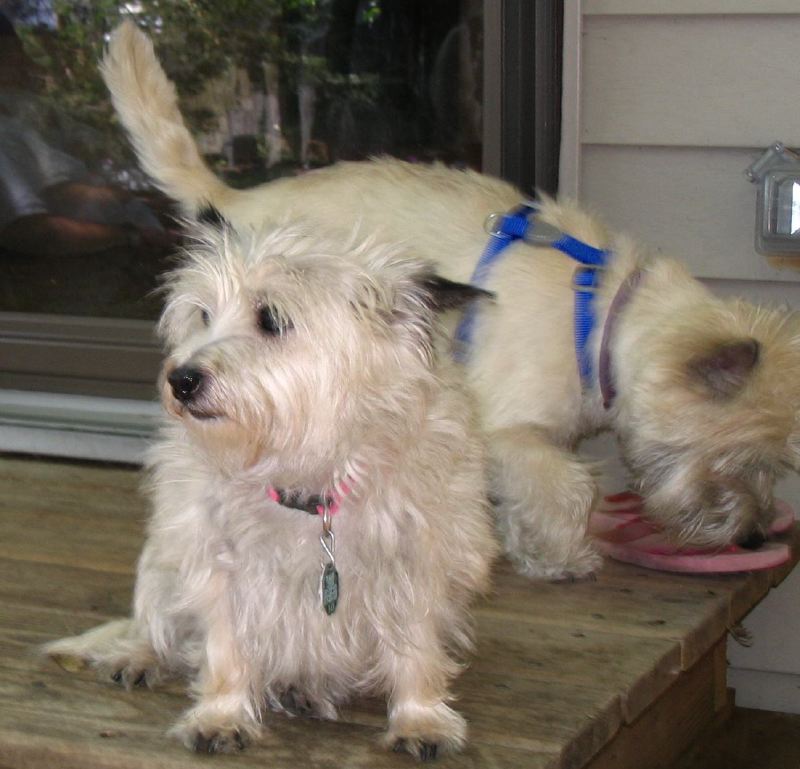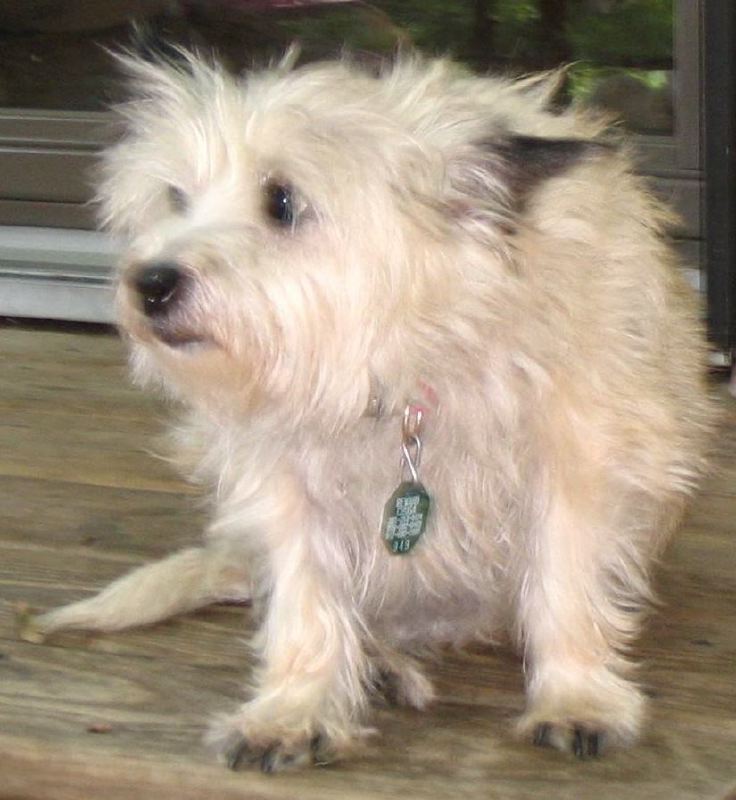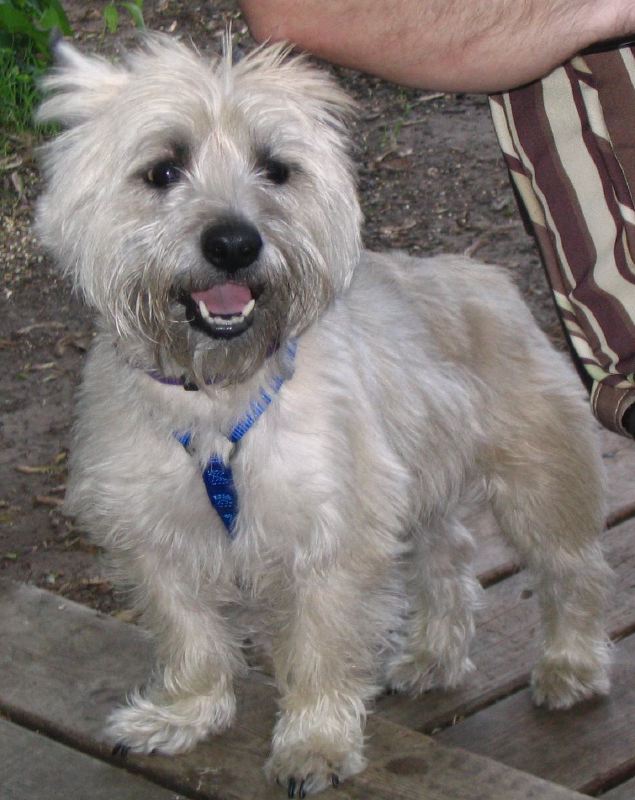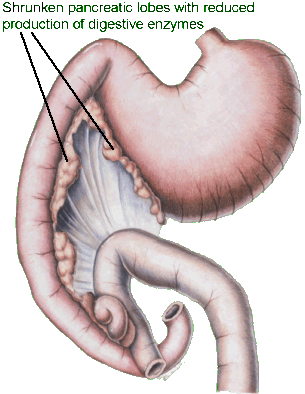|
Paris wears her usual "worried" look
Daisy has a new fan; Jay wanted to take her home
Shannon writes (referring to Shiloh, I assume):
Isn't he the cutest? And so very friendly!
Later that day, Chuck writes:
We noticed that Shiloh had a bit of an aroma about him
Andy the Airedale is broken-hearted. He came on too strong trying to get Shiloh to play, so now it's gonna take a while for them to make friends. Bear & wiener dog are "protecting" Shiloh from the big bad Airedale. Kinda funny to watch. Andy is puzzled by all this.
Shiloh slept with the rest of us. Everything went just fine. ZZZzzzzzzzz.
|
|
|
WHY IS SHILOH A "SPECIAL NEEDS" CAIRN?
Several concerned folks have written to ask what Shiloh's medical issues are, so Shell has given a rundown. Shiloh will be a very expensive - and perhaps prolonged - foster, so any contributions towards his care will be greatly appreciated! |
|
EPI (exocrine pancreatic insufficiency) is a pancreatic condition where the dog's pancreas doesn't produce sufficent enzymes to digest food properly. As a result, the dog often appears thin and undernourished and can have soft stools (and lots of them). EPI can be controlled with diet (and Shiloh is on a prescription ID food), as well as a powder supplement called Avoderm.
Over the course of the next couple of weeks, CRUSA be looking for Chuck & Jay' feedback on how Shiloh is doing with his condition, before he can be put up for adoption. He'll be listed as a "special needs" dog (with a lower adoption fee). Shell's vet reviewed Shiloh's records and seemed to think that was a condition that could be controlled with diet & supplements (Avoderm).
Some FAQ:
What is exocrine pancreatic insufficiency (EPI)?
Exocrine pancreatic insufficiency, due to the reduction in pancreatic enzymes results in failure to digest the food eaten and in consequence the dog is seriously malnourished.
What are the signs of EPI?
The dog usually has a ravenous appetite but gives a malnourished appearance, often appearing thin or emaciated. Frequent, copious soft feces are passed. These are often fatty in nature due to lack of digestion.
Are any particular breeds affected?
The condition is relatively common in the German Shepherd dog but can be seen in all breeds.
Is any particular age group more prone?
It occurs in dogs of all ages. In relatively young dogs it is often due to atrophy or shrinking of the enzyme producing cells. In older dogs chronic infection of the pancreas (chronic pancreatitis) can often be a cause.
Worms and other intestinal parasites can contribute and it is certainly worthwhile consulting your veterinarian about deworming your dog on a regular basis.
What are the usual signs?
Dogs with EPI frequently have a ravenous appetite but are thin and never gain weight. Extra feeding produces even greater amounts of watery malodorous feces. These are frequently very fatty. Flatulence and bowel rumblings often accompany the condition and some dogs will resort to eating their own feces. One theory propounded for this is that since the enzymes pass out unchanged with the stool, the dog instinctively eats its own feces in order to try to recycle the enzymes.
How is EPI diagnosed?
Often a feces sample will indicate the cause and this can be positively confirmed with blood tests. Since the condition can be due to loss of glandular tissue as well as damage due to infection (pancreatitis) biopsies may be necessary in order to definitely establish the cause.
Once it is established that pancreatic insufficiency is present your veterinarian may well check for diabetes mellitus (sugar diabetes) during the investigation since the pancreas is also involved in the production of insulin, the lack of which leads to this condition.
What is the treatment?
Dogs having uncomplicated pancreatic insufficiency, i.e., no diabetes, can often be treated very successfully with dietary modification together with pancreatic enzyme supplementation which can be supplied in the form of tablets, capsules, or powder to mix on the food. Alteration to the diet will involve a low fat, low fiber diet. Sometimes your veterinarian may advise antibiotics particularly if there is bacterial overgrowth in the bowel which can accompany the condition. In mild cases, a special diet may be all that is necessary to control the condition.
Do I have to alter my dog's routine?
Exercise levels may have to be restricted if the dog is very thin, but usually activity levels can remain normal. Sometimes it may be necessary to feed smaller meals more frequently.
Is treatment curative?
Like diabetes mellitus, treatment for exocrine pancreatic insufficiency is palliative rather than curative. A few cases spontaneously resolve but often treatment has to be maintained for life.
What is the cost of treatments?
It is worthwhile discussing the costs with your veterinarian at the outset, particularly if pancreatic enzyme replacement therapy is involved. Because of this and the special diets involved, obviously there will be an ongoing expense. Initially your dog may have to be seen fairly frequently but diarrhea usually resolves within a week or two and the dog starts to gain weight. It may then be possible to reduce the amount of supplementation necessary. The special diets prescribed usually have to be maintained for life. Regular routine check ups, sometimes involving laboratory testing, will be necessary throughout the dog's life.
See the following link for additional information:
| |





CONTINUE WITH SHILOH HERE









